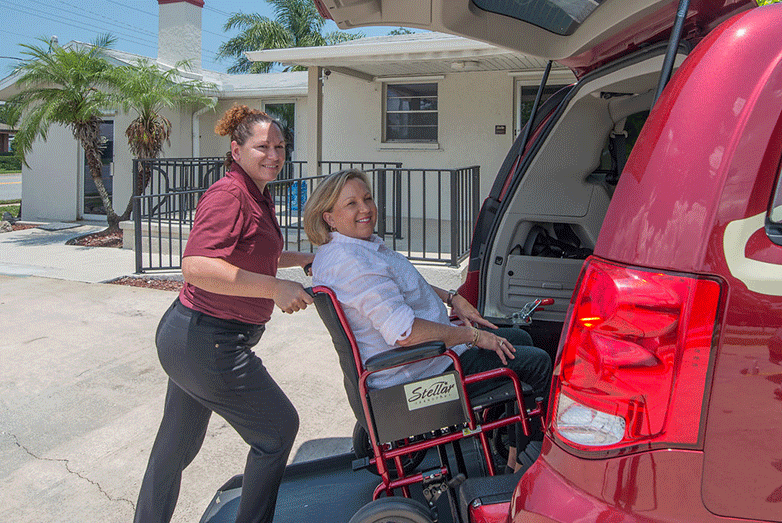With the proper precautions it is safe for elderly to fly but the better option may be non-emergency long distance medical transportation. This type of service provides more one-on-one care for your loved one without the stress of going through airport security, loading their luggage on the plane and so forth.
4 Hazards Of Air Travel For Elderly Passengers
As we age we become more likely to suffer illness or injury. Airline travel increases these risks due to stress, high altitudes, jet leg and so forth.
1. Injury
It’s easy for an elderly person to become injured while boarding or un-boarding a plane. With people rushing here and there elderly people may get bumped into, or simply lose their balance in the shuffle. Someone may accidently bump them with a stroller or luggage, causing them to fall. A fall could cause a bad bruise or it could lead to something as serious as a broken rib, fractured hip or worse. Even if you take all other passengers out of the equation, simply walking to the bathroom when turbulence hits could lead to injury. If elderly passengers are traveling alone how will they handle wheelchairs, walkers and any other walking aids without the potential for injury?
2. Discomfort
Traveling by airplane isn’t comfortable for the most limber and youthful of us, let alone those with preexisting conditions. While physical discomfort may not be life threatening by any means, it can aggravate existing conditions to the point of alarm. For instance, reduced air pressure in the airplane cabin can further stress cardiovascular disease as well as the lung condition chronic obstructive pulmonary disease. If your loved one suffers from arthritis or any other form of joint pain, these conditions can be made worse by sitting for long periods of time.
3. Jet Lag
Just traveling across the US alters the clock 3-hours, which can drastically throw off an elderly individual’s schedule in regards to sleep and when to take medications. Not only is this stressful but it contributes to exhaustion. As a result, one may feel nauseous, develop a headache or have difficulty going to sleep despite being exhausted. All of this can disrupt the immune system and lead to further complications.
4. Illness
It is so easy to pick up illnesses like the flu, pink eye and so forth in an airport. The elderly do not have the same immune system strength they once did; as a result it’s even easier for them to get sick. Elderly passengers are more likely to pick up pneumonia, the flu and other illness while traveling by plane.
The Safer Alternative: Long Distance Medical Transportation
The first way to prevent risks associated with air travel is to avoid it all together. If possible, long distance non-emergency medical transportation services that transport patients in vehicles offers a safer option that presents less stress and overall risk.
Stellar Transportation provides long-distance transportation to anywhere in the US, so long as the destination is at least 150+ miles from Melbourne, Florida. As a result, your loved one can skip the stress of going through an airport entirely. We pick patients up right at their door, and even offer door-through-door services to help patients that need assistance getting out of their home. We ensure superior comfort and safety the entire way. Plus, we cater to patients of all mobility, specializing in wheelchair and stretcher transportation.
Tips For Safer Elderly Air Travel
If there’s no way to get around traveling by plane, here are some tips to help your elderly loved one remain safe:
– Passengers need a doctor’s note to show at the check-in gate in order to get seats with additional legroom or other desirable traits.
-Reserve wheelchairs ahead of time to ensure a passenger is able to get one. While they should always be available, if there are a bunch of flights coming in at the same time there’s always the risk there won’t be any chairs left.
-You can request an electric cart for elderly passengers that struggle walking but don’t use a wheelchair. Certain airlines, such as Delta, offer motorized carts but only at certain airports.
-Pack a travel pillow and blanket to help increase comfort throughout the flight.
-Have them check their luggage, even if it is small enough to be considered a carry-on, so that they are not lugging anything heavy through the airport.
-Keep pills in an organized box they keep with them on the plane so that they don’t forget to take important medications.
-Make sure that they arrive early enough that they don’t have to rush through the airport and risk injury.
-Request an aisle seat near a bathroom to make it easier for them to get out of their seat and access the restroom as needed.
-If you can’t personally take your loved one to the airport, arrange for medical transportation to take care of them so that they arrive safely and on time.

